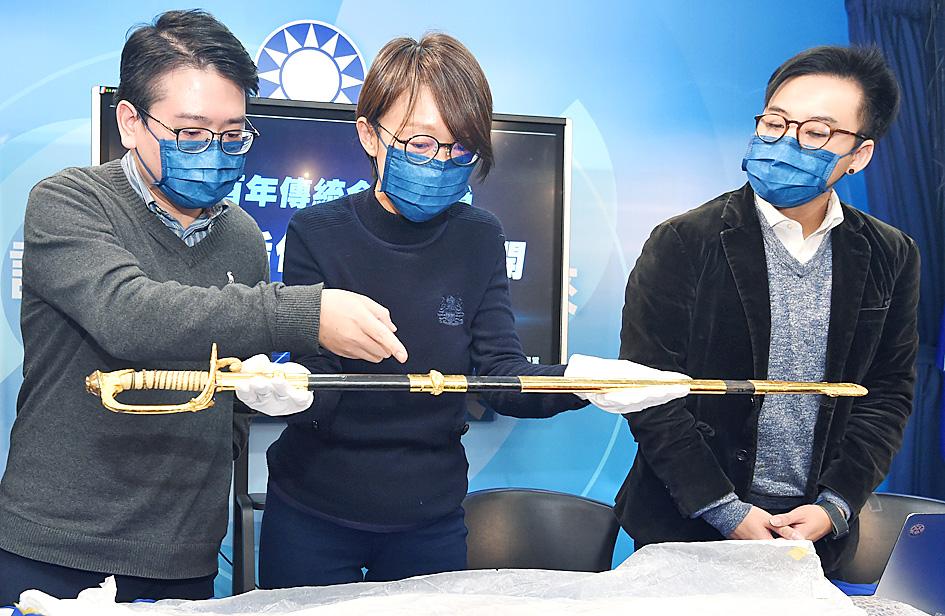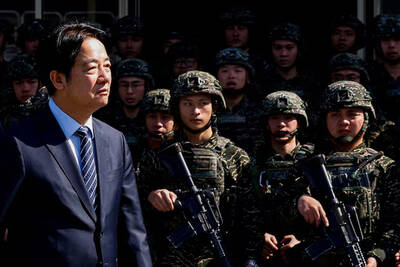The Chinese Nationalist Party (KMT) is to use non-fungible tokens (NFTs) in a bid to revitalize the party’s archives, KMT officials said yesterday at a news conference in Taipei that showcased a ceremonial sword belonging to Chiang Kai-shek (蔣介石), the first piece of the collection to be utilized in the project.
NFTs are a blockchain technology used for digital files that provide proof of ownership or a certificate of authenticity.
KMT Culture and Communications Committee deputy director-general Lin Chia-hsing (林家興), who is also the curator of the archives, said that digitizing the collection is part of the party’s efforts to revamp its image and fundraising capabilities via innovation and technology.

Photo: Liao Chen-huei, Taipei Times
The drive was authorized by the KMT Central Standing Committee in October, Lin said.
NFTs of Chiang’s sword featured at this year’s CES (formerly the Consumer Electronics Show), which was held in Las Vegas, Nevada, last week, he said.
The sword was presented to Chiang by a San Francisco-based overseas compatriot association in 1949 and its blade bears an inscription that reads: “For the suppression of rebellion and the founding of the nation,” Lin said.
Taiwan Blockchain Academia president Peng Shao-fu (彭少甫) said NFT technology could help the KMT contest Beijing’s narrative that the Chinese Communist Party battled imperial Japan during World War II.
The technology could also boost the KMT’s appeal to young people by bringing artifacts in its collection to a broader audience, helping to promote the party’s perspective on the history of the Republic of China, Peng said.
The KMT is to use NFTs as gratitude certificates for donors and the transaction fees would further bolster the party’s revenue, he said.
“Creating digital exhibits of precious artifacts in the metaverse would be particularly meaningful when starting a dialogue with young people,” Peng said.
Additional reporting by CNA

The Taipei Mass Rapid Transit (MRT) Wanda-Zhonghe Line is 81.7 percent complete, with public opening targeted for the end of 2027, New Taipei City Mayor Hou You-yi (侯友宜) said today. Surrounding roads are to be open to the public by the end of next year, Hou said during an inspection of construction progress. The 9.5km line, featuring nine underground stations and one depot, is expected to connect Chiang Kai-shek Memorial Hall Station to Chukuang Station in New Taipei City’s Jhonghe District (中和). All 18 tunnels for the line are complete, while the main structures of the stations and depot are mostly finished, he

The first global hotel Keys Selection by the Michelin Guide includes four hotels in Taiwan, Michelin announced yesterday. All four received the “Michelin One Key,” indicating guests are to experience a “very special stay” at any of the locations as the establishments are “a true gem with personality. Service always goes the extra mile, and the hotel provides much more than others in its price range.” Of the four hotels, three are located in Taipei and one in Taichung. In Taipei, the One Key accolades were awarded to the Capella Taipei, Kimpton Da An Taipei and Mandarin Oriental Taipei. Capella Taipei was described by

Minister of Economic Affairs Kung Ming-hsin (龔明鑫) yesterday said that private-sector refiners are willing to stop buying Russian naphtha should the EU ask them to, after a group of non-governmental organizations, including the Centre for Research on Energy and Clean Air (CREA), criticized the nation’s continued business with the country. While Taiwan joined the US and its Western allies in putting broad sanctions on Russia after it invaded Ukraine in 2022, it did not explicitly ban imports of naphtha, a major hard-currency earner for Russia. While state-owned firms stopped importing Russian oil in 2023, there is no restriction on private companies to

President William Lai (賴清德) is expected to announce a new advanced “all-domain” air defense system to better defend against China when he gives his keynote national day speech today, four sources familiar with the matter said. Taiwan is ramping up defense spending and modernizing its armed forces, but faces a China that has a far larger military and is adding its own advanced new weapons such as stealth fighter jets, aircraft carriers and a huge array of missiles. Lai is expected to announce the air defense system dubbed “Taiwan Dome” in his speech this morning, one of the sources said. The system